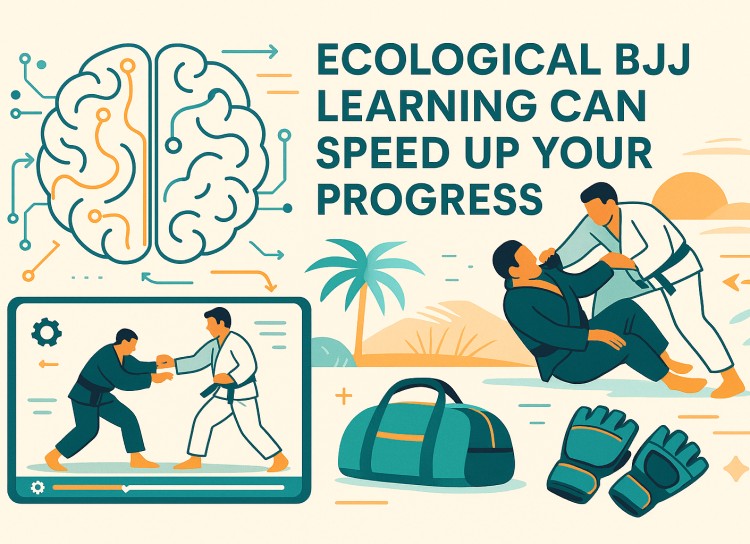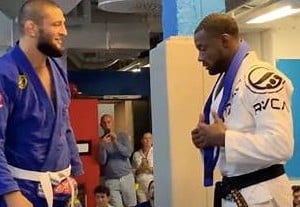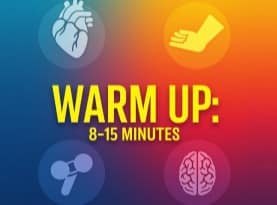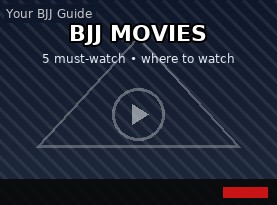Why the Ecological Approach to Learning BJJ Can Accelerate Your Progress
In Brazilian Jiu-Jitsu (BJJ), many students spend years drilling techniques, only to struggle to apply them under pressure. If you’ve ever felt like your learning disappears the moment resistance kicks in, you’re not alone — and you’re not learning wrong. You’re likely learning unnaturally.
That’s where the ecological approach to skill development comes in. Rooted in neuroscience and motor learning theory, this training method mirrors how our brains naturally acquire complex skills. It’s practical, intuitive, and it can radically speed up your jiu-jitsu development.

What Is the Ecological Approach?
The ecological approach to learning emphasizes learning through interaction with one’s environment. Instead of memorizing techniques in a static, idealized form, you develop skills by solving real movement problems, under real conditions, with real resistance.
This method is driven by ecological dynamics concepts, which study how the brain, body, and environment interact during learning. In BJJ, that means:
- No step-by-step repetition
- No “perfect technique”
- Just purposeful, constraint-led problem solving
Think of it this way: instead of being told what to do, you’re placed in situations where your brain figures out what works — and that difference is everything.
How Your Brain Learns
Contrary to the old-school idea of “input → store → retrieve,” modern neuroscience shows that learning isn’t about memorizing and reproducing exact movements. It’s about perceiving opportunities for action (“affordances”) and adapting in real time.
Here’s how it works:
- Perception: Your nervous system picks up on key visual, tactile, and spatial cues, like your opponent’s weight shift or limb position.
- Action: You attempt a movement based on those cues.
- Feedback: The outcome (success or failure) shapes your next attempt.
- Adaptation: Your brain updates its internal model, refining your timing and movement.
This feedback loop, known as perception-action coupling, forms the foundation of skill development. The more reps you get within this loop, the faster and deeper you learn. The ecological approach maximizes this loop with every repetition.
Read our more in-depth research into how the Brain Learns Brazilian Jiu Jitsu.
Why It Speeds Up Learning
1. You Learn in Context
Instead of drilling in isolation, you learn within the environment where the skill is applied; under resistance, pressure, and unpredictability. That makes skill transfer to sparring almost immediate.
2. You Develop Adaptability
You don’t just memorize “the armbar.” You learn how to armbar different people in different positions and ways. This builds flexible, robust skills — the kind that work even when things aren’t perfect.
3. You Build Intuition, Not Dependence
Ecological learning trains your nervous system to respond instinctively, not search for a technique in your memory bank. You become fluent in grappling, not just literate.
4. You Reduce Cognitive Overload
Trying to remember sequences during sparring slows you down. The ecological approach offloads memory and builds reaction patterns that are faster, more natural, and neurologically efficient.
Evidence from Science & Sports
Research in motor learning and elite sports shows that athletes trained with ecological and constraints-led approaches:
- Perform better under pressure
- Retain skills longer
- Adapt quicker to new opponents
- Make faster decisions in complex environments
These are precisely the outcomes BJJ practitioners want, especially in live rolling or competition.
Practical Example in BJJ
Let’s say you want to get better at passing guard.
Instead of drilling a toreando pass 100 times, the ecological method would have you:
- Play a game where your partner tries to retain open guard while you try to pass
- Use constraints like “no grips” or “pass only on one side”
- Discover when to step in, when to retreat, and how to angle your body to pass
This develops not just one pass, but a passing skillset — built through real-time problem solving.
The Shift: From Technique Collector to Problem Solver
Traditional drilling creates technique collectors — people who know 100 moves but struggle to use them.
The ecological approach cultivates problem solvers who can adapt and apply their knowledge in complex, real-world scenarios.
Which would you rather be?
Final Thoughts
The ecological approach isn’t just a different way to train — it’s a return to how we’re wired to learn. From childhood play to elite-level sport, the most powerful learning comes from real engagement, not rote repetition.
By understanding that BJJ isn’t about only memorizing moves and starting training in situations that mirror the chaos and creativity of live rolling, your brain becomes more attuned, your reactions more precise, and your game more effective, in less time.
Stop memorizing. Start adapting. That’s how you truly learn jiu-jitsu.
Learn 5 Ecological BJJ Games to start with.
Related Reading
- Games Beginners Can Start With
Four ecological games - Best Brazilian Jiu Jitsu Instructionals
The top BJJ videos to learn from




